Legacy Stories
Cameron Adamson
Cameron Adamson was a bright, young man who suffered numerous concussions during his high school wrestling career. He decided to enlist in the Marines after graduating from high school, where he endured more brain trauma. Cameron’s time in the military was a challenge, and he was honorably discharged a few years later. He fought with depression afterward and started to drift away from his family. He took his life in January 2021 at the age of 22. Below, his father Daryl Adamson shares the Legacy of his son in the hopes of helping other veterans and servicemembers who may be struggling.
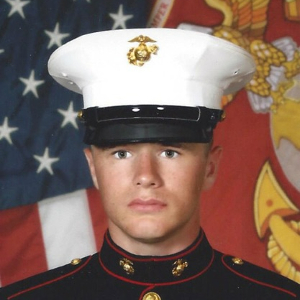
By Daryl Adamson, Cameron's father
Warning: This story contains mentions of suicide and may be triggering to some readers.
I remember the day Cameron called me at the Pentagon, a week before his high school graduation and proclaimed he was enlisting in the Unites States Marine Corps instead of going to college. Truly not the path I envisioned for Cameron, and a very different path he was about to take. Cameron had a fund already in place to pay for his college, and he was a good student at competitive Conneaut Lake High School in Pennsylvania. Cameron surprised our entire family by telling us he wanted to enlist in the Marine Corps. As I look back, the truth is, his choice in enlisting in the military over college deserved much more than a blank stare.
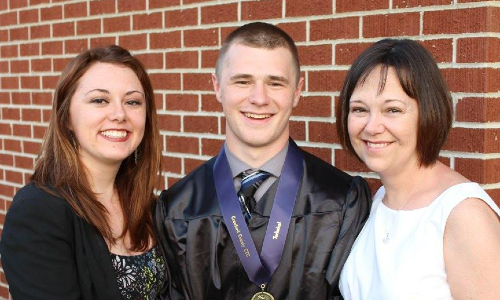
Since Cameron died by his own hand in January 2021 at the age of 22, over the several months since his passing I have had some says directly to me: "suicide is a selfish act." I was not angry or insulted, but rather very sad that people still believe this to be true. If anything, in the mind of the one who takes their own life, it’s a selfless act. In Cameron's case, his writings, and the discussions he had before he died, indicate to me that he felt he was a burden to those who loved him. In his suffering mind, Cameron felt we would all be better off without him.
Based on my experience with Cameron the little I had as his father, I believe his mind was so tortured and he was in so much mental pain, he was not thinking rationally when he took his own life. That is not what I would call selfish. Reading online from most since his death, Cameron was the kindest, most giving and thoughtful man many have ever known, and he would never do anything to intentionally hurt anyone.
Cameron grew up in Saegertown, PA and was an incredibly bright and intelligent kid. Due to the nature of my work in the Navy, I was often far away while he stayed with his mom and older sister in Pennsylvania. Cameron was close with the entire family and despite our physical distance, we still spoke often, and he had a very happy childhood.
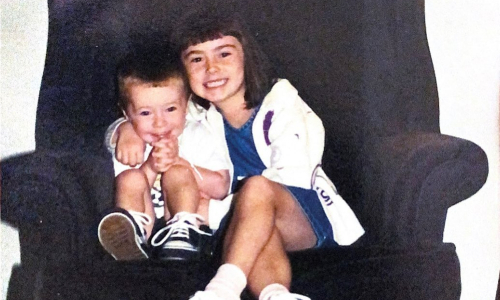
Cameron continued to be an outstanding student in high school. He was part of the varsity wrestling team where he excelled but unfortunately experienced a couple of severe concussions.
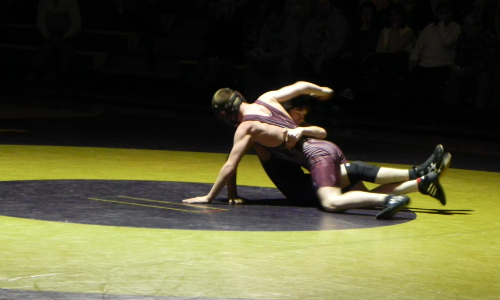
Communication started to fade during Cameron’s sophomore year. After a few of his head injuries, he felt depressed and pulled away from us a bit. Recovery wasn’t going as expected and he became increasingly frustrated. We were able to reel him back in for a while and it seemed as if he was all set to attend college the following year.
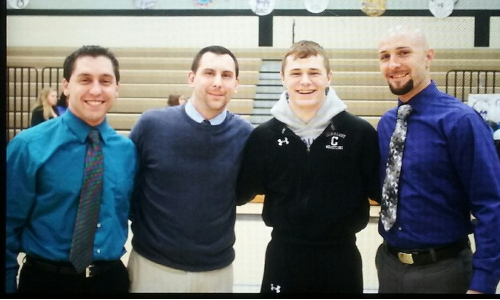
That is, until a recruiter from the Marines reached out and asked if Cameron was interested in joining. The next thing we knew, he was off to boot camp only one week after graduating from high school. He told us he wanted to branch out from what he was accustomed to and have his own purpose in life. After boot camp, he served a four-year enlistment and was deployed for six months to Iraq.
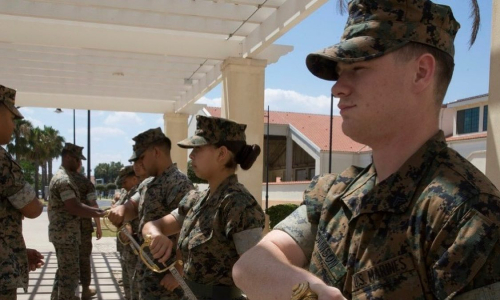
Upon his return, Cameron seemed like a different person. We knew Cameron had suffered from traumatic brain injuries (TBIs) while in the Marines; once in a car wreck and another while on deployment in Djibouti. He was more withdrawn from the family and preferred to be alone. A counselor suggested he was struggling with PTSD, but it was never officially diagnosed. We believe his changes in behavior were linked to the head injuries he suffered both during his time playing contact sports and in the military.
There were so many cracks Cameron fell through. I don’t think he had access to the appropriate resources he was looking for and needed. I was told he was getting help, but no one had any records of his care when I checked. He was passed around from one person to the next until his honorable discharge from the Marines. Though he originally had a job lined up, things didn’t work out as planned. I know Cameron felt left behind, watching his friends from high school going off to college, getting married, and buying a house. Yet here he was with nothing to show for his service.
Cameron was popular, talented, and loved by his many friends and family members. Yet he felt alone in his struggles.
It's hard to see a possible lesson the moment you get the phone call. It's difficult to find a meaning when you're attending the funeral with their anguished mother, sister, and devastated friends. It's challenging to feel like you've somehow been educated in all matters of life and death and the moments in between when you're struggling to find their last text messages and re-listening to voicemails and holding onto whatever lingering piece of them you have left.
But time as pushed forward and the pain becomes a second skin and the longing becomes commonplace, you realize a death like this, a death that is self-inflicted and self-decided and self-manufactured, is a death with a lot of lessons.
When my son chose to end his own life, I learned that we should not blame ourselves as a family (but it is a difficult task). While there were moments, I believe we could have intervened and things we could have said, the complexity of individual’s decisions and the way in which those choices manifest are too layered and mosaic to possibly understand. We use our own hindsight against us, but even when it is 20/20, it is a filtered view. It is colored in guilt and agony and while it seems clear, it is nothing if not blurry.
I feel situational depression and in the days since Cameron died, believe it is in no way even close to what Cameron must have felt suffering from his depression. The despair and hopelessness I feel as a failed father are so tortuous, I can't even imagine what Cameron was going through in his final days. A month or so before he died, Cameron told me he was fine and he was working to get his back on track, but also afraid. He could not (or would not) share with me what he was afraid of. Only now do I realize how much he must have been suffering.
I believe there are two possible reasons why some say suicide is a selfish act. The first may be an attempt to comfort the suicide loss survivor(s) in an effort to help shift the guilt burden (blame) to the one who died. The second reason may be that it is easier for them to say “suicide is a selfish act” rather than really try to process why someone would take their own life. Being a suicide loss survivor gives one much more perspective - I hope to use this perspective to educate others.
After Cameron’s passing, his sister Kayleigh suggested donating his brain to the U.S. Department of Veterans Affairs VA, Boston University, and the Concussion Legacy Foundation (VA-BU-CLF) Brain Bank. She had done some work and research in Boston for her PhD degree in psychology and recommended we reach out. We immediately agreed since it was a way to honor Cameron’s legacy and allow him to help others even after death. If his donation helps even one fellow veteran, he will have made a huge difference.
While there was no official diagnosis of Chronic Traumatic Encephalopathy (CTE), the researchers found disturbed white matter in Cameron’s brain. There is the possibility he was in the early stages of the disease, but it’s not definitive.
Since my son died by suicide, I learned that we rank death and, in turn, the level of mourning or heartache we should feel about it. While the result is the same, the manner in which a person dies somehow determines the manner in which the people left behind, should mourn. It's strange, how we quantify death in order to fit our morals or beliefs or feelings of justice and vengeance.
I learned that death, itself, is strange.
I learned that while strangers react differently to the death of another stranger, depending on how they died, loves ones do not. Regardless of who or when or why or how, a loss is a loss to those who loved you most. The pain is the same. The sense of endless longing is the same. The forever wishes to see them one more time are the same.
I learned that if silence wasn't considered a strength and vulnerability wasn't considered a weakness, there would be far less funerals attended, and memorials visited.
I learned that there are moments in life, and in death, which do not come with answers. That while we so desperately need to understand the reasons why people do what they do or say what they say or believe what they believe, some things are not meant for understanding. That while it would calm our minds and hearts to know that our questions have conclusions, sometimes, it isn't about our peace of mind. It is about theirs.
I learned that those left behind are not alone in their pain, nor are they particularly set apart because of it. Others have felt what you've felt and have tasted the tears you have tasted and have struggled to adequately describe it all. Just like you.
I learned that there is no single, foolproof path towards healing. While some need to talk, others desperately require the comfort of silence. While some seek solitude, others feel safe in a sea of strangers. While some need to saturate themselves with memories, others need distance and time before thinking about the one they lost. No way is right or wrong.
And I learned that, yes, there is a lesson to be learned at the end of every life, regardless of how that life was lost. That when the pain becomes a second skin and the longing becomes commonplace, you will be changed in a way that is both hurtful and helpful. Despite efforts to get him help, he slipped through our grasp. It is now that I must come to terms with the most brutal outcome for a parent: We could not save him.
And it is that knowledge that, perhaps, can help someone else.
Before it is too late.
I would highly encourage other families of veterans to consider donating their loved one brains as part of Project Enlist. Brain donation helps researchers gain a better understanding of the unique effects of military brain trauma exposure. I myself have also pledged my brain in the hopes of helping advance research for the next generation of veterans and servicemembers.
Suicide is preventable and help is available. If you are concerned that someone in your life may be suicidal, the five #BeThe1To steps are simple actions anyone can take to help someone in crisis. If you are struggling to cope and would like some emotional support, call the National Suicide Prevention Lifeline at 988 to connect with a trained counselor. It’s free, confidential, and available to everyone in the United States. You do not have to be suicidal to call. If you’re not comfortable talking on the phone, consider using the Lifeline Crisis Chat at https://988lifeline.org/chat/
Are you or someone you know struggling with lingering concussion symptoms? We support patients and families through the CLF HelpLine, providing personalized help to those struggling with the outcomes of brain injury. Submit your request today and a dedicated member of the Concussion Legacy Foundation team will be happy to assist you.
You May Also Like
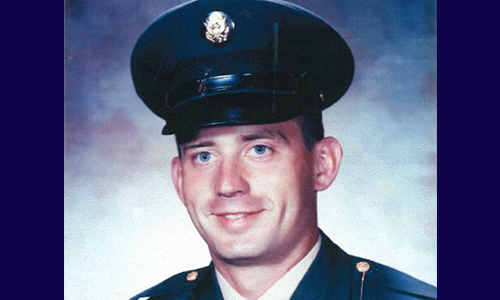
Vietnam veteran Allen Way suffered from PTSD and TBI symptoms before researchers diagnosed him with CTE after death. Learn about his struggle, and beautiful life of service in his Legacy Story as told by his widow.
Read Allen Way's Legacy Story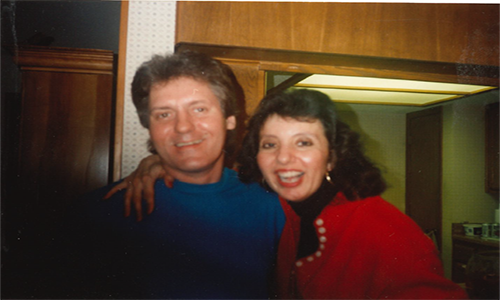
When he returned home from the war, Keith Pinkham struggled with the demons that afflict many soldiers. A devoted husband for 32 years, he died at just 65. Keith's wife donated his brain to the VA-BU-CLF Brain Bank.
Read Keith Pinkham's Legacy Story